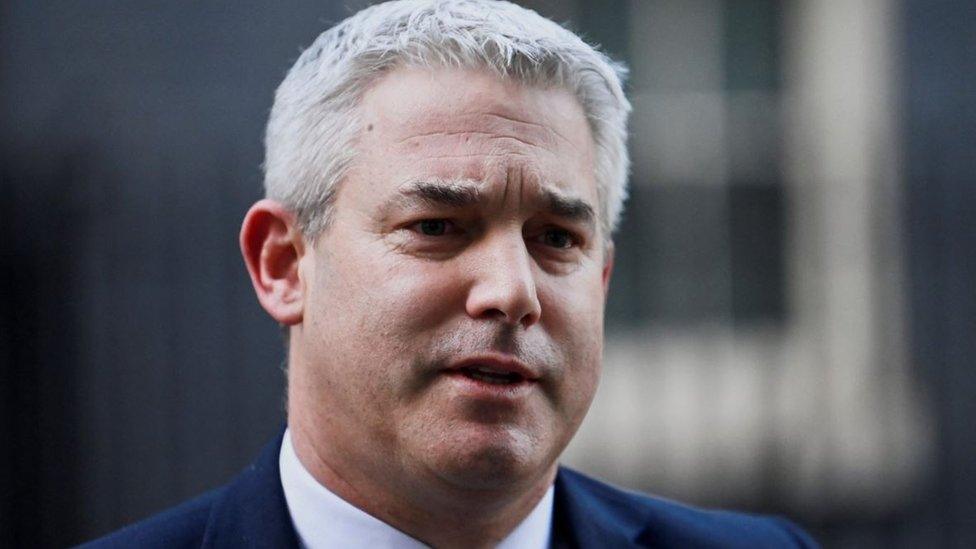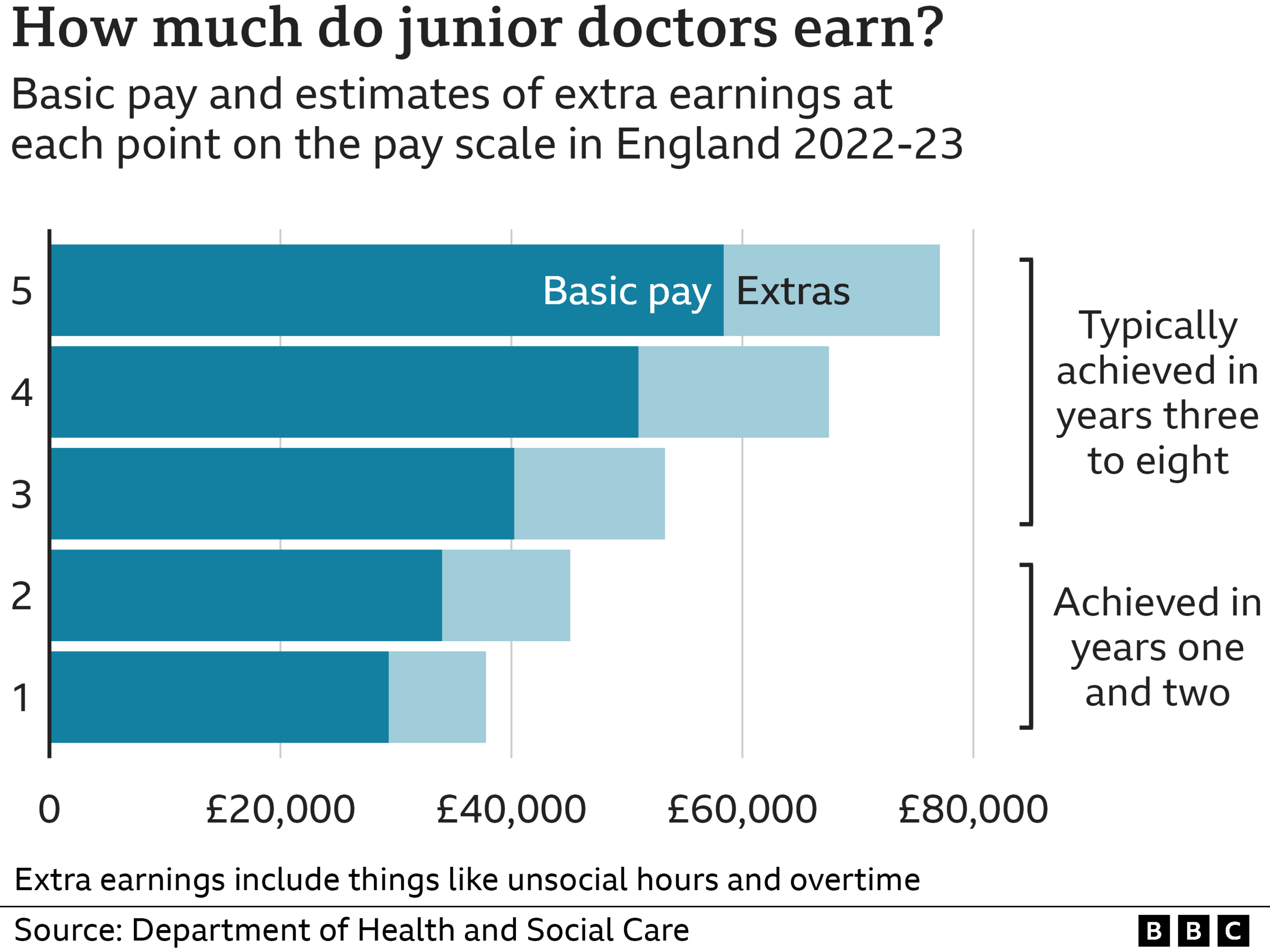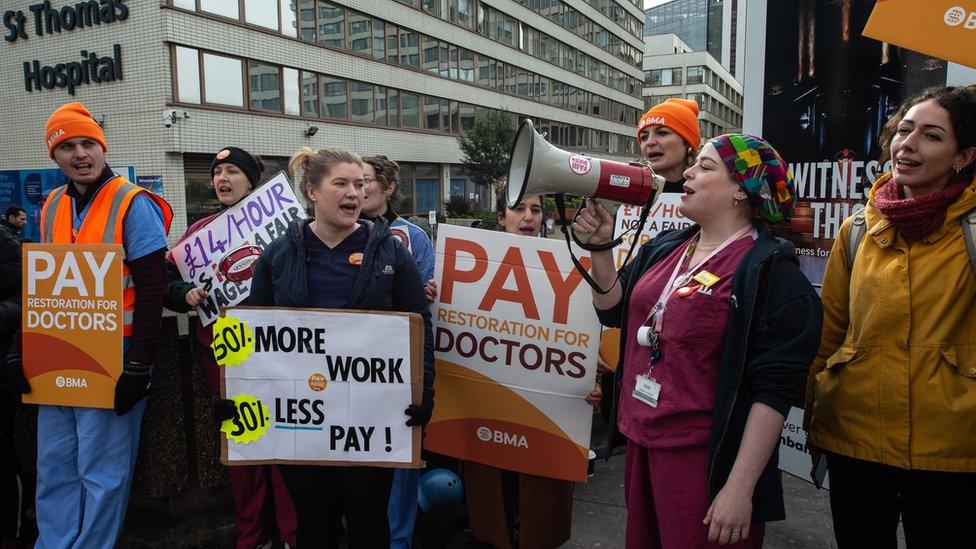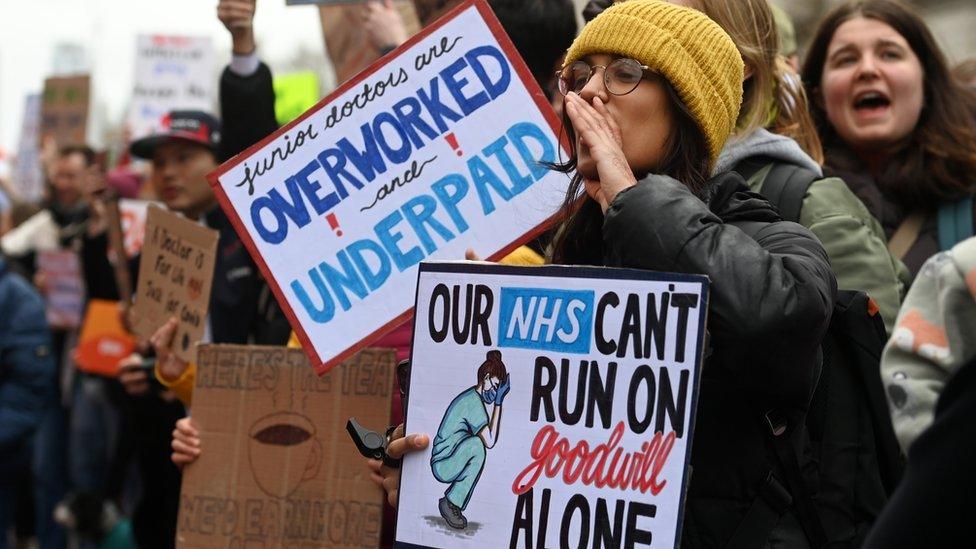Junior doctor strike: Union's pay demands unrealistic, says Steve Barclay
- Published

Health Secretary Steve Barclay says next week's strike "threatens to cause significantly more disruption" than previous walkouts
The junior doctors' union appears "intent on maintaining a militant stance" which "hampers serious talks over pay", the health secretary says.
Writing in the Telegraph, external, Steve Barclay said pay demands by the British Medical Association (BMA) were "unrealistic".
Junior doctors in England are set to stage a four-day strike from Tuesday.
The BMA wants a 35% pay rise to make up for 15 years of below-inflation wage rises, It says falling pay has caused a recruitment and retention crisis.
Dr Vivek Trivedi, co-director of the junior doctors' committee at the BMA, said on Saturday that Mr Barclay is yet to put a serious offer on the table.
"All we're asking for is a credible offer that shows us he's serious, that we can start a path of negotiations to try to address the real-terms pay cut," he said.
The strike is due to take place from 07:00 BST on Tuesday until 07:00 BST on Saturday.
The NHS national medical director, Professor Sir Stephen Powis, is warning that the strike will cause "unparalleled levels of disruption" as it is longer than previous strikes and comes after the bank holiday when many staff are "taking much-needed holiday".
Up to quarter of a million operations and appointments could be postponed because of it, the NHS Confederation - the body which represents health service trusts - has warned, and health bosses are more concerned about this than they have been about any other strike.
Th BMA has refused to exempt any services but says it has plans to protect patients.
'Out of step'
Mr Barclay said the walkout - just after the bank holiday and which "coincides with school holidays, Ramadan and Passover", has been timed to "cause maximum disruption".
Mr Barclay said pay demands by junior doctors were "out of step with pay settlements in other parts of the public sector" and claimed some doctors could receive an extra £20,000 a year if wage demands were met.
He said he wanted to "see a fair deal that increases their pay" but could see "no prospect of getting into serious and constructive talks" unless the strike action was cancelled and the BMA changed its pay demands.
The BMA says junior doctors' pay has fallen by 26% since 2008, once inflation is taken into account.

Junior doctors represent more than 40% of the medical workforce and include those fresh out of university through to experienced medics with more than 10 years of experience. Around two-thirds are BMA members.
In a ballot issued in February, 98% of eligible BMA members backed strike action, external, on a turnout of 77%
Deputy chairman of the BMA junior doctors' committee Dr Mike Greenhalgh said falling pay had caused "a real recruitment and retention crisis" in the health service.
He told the BBC on Saturday: "It's hard to negotiate when only one side is doing it, and we're not getting anything back from the government on that front."
He added: "We're happy to meet at any time. We would still meet [Mr Barclay] over the bank holiday weekend before the industrial action next week.
"And if he was to bring a credible offer to us, it could still, even at this late stage, avert action."
During last month's strike, hospitals drafted in consultants to provide cover but it is estimated a quarter of them are on leave due to the Easter holidays.
The BMA says it will not exempt any services but that there are plans to protect patients, which could involve pulling junior doctors off the picket line if individual hospitals report lives are in immediate danger.
The Department of Health and Social Care has said the government is working with NHS England to put contingency plans in place to protect patient safety during the strike.
"The NHS will prioritise resources to protect emergency treatment, critical care, maternity and neonatal care, and trauma," a spokesman said.

Are you a junior doctor with a view on the strike? Are you a patient affected? Share your experiences by emailing haveyoursay@bbc.co.uk, external.
Please include a contact number if you are willing to speak to a BBC journalist. You can also get in touch in the following ways:
WhatsApp: +44 7756 165803
Tweet: @BBC_HaveYourSay, external
Please read our terms & conditions and privacy policy
If you are reading this page and can't see the form you will need to visit the mobile version of the BBC website to submit your question or comment or you can email us at HaveYourSay@bbc.co.uk, external. Please include your name, age and location with any submission.
Related topics
- Published8 April 2023

- Published6 April 2023

- Published18 May 2023